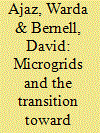|
|
|
Sort Order |
|
|
|
Items / Page
|
|
|
|
|
|
|
| Srl | Item |
| 1 |
ID:
171392


|
|
|
|
|
| Summary/Abstract |
Increasing distributed renewable energy generation renders balancing of energy supply and demand more challenging. Peer-to-peer (P2P) exchange of decentrally generated energy is a promising means to optimize renewable energy flows. While previous research has primarily focused on the technological and economic benefits of P2P energy trading, little research has investigated customer preferences in this context so far. It is thus still unclear to what extent private actors such as homeowners are actually willing to participate in P2P energy communities and if so, under which conditions. Here, we address this research gap by analyzing homeowners' trading decisions in simulated P2P electricity trading scenarios. Findings based on a sample of 301 German homeowners show that community electricity prices and state of charge of private energy storages are key determinants of homeowners’ trading behavior. We moreover identified four target groups that systematically differed in their decision-making strategies ranging from price-focused prosumers (38.9%) to classic non-trading consumers (22.6%). Our findings provide promising insights for the design of P2P communities and allow policy makers to more accurately predict risks and benefits associated with P2P projects. Finally, our findings contribute to the development of tailored policy instruments aiming to increase P2P trading in decentralized energy communities.
|
|
|
|
|
|
|
|
|
|
|
|
|
|
|
|
| 2 |
ID:
177387


|
|
|
|
|
| Summary/Abstract |
The increasing penetration of microgrids in appears to be part of a transition toward electricity distribution systems that are more decentralized than the current system. With microgrids gaining space as a competing and parallel distribution grid model and challenging the current centralized grid system, studying their adoption presents an opportunity to understand this socio-technical transition in the energy system. This study looks at this ongoing change in the United States and applies the Multi-Level Perspective framework to explore the drivers, contexts, processes, policies, institutions, and interactions that affect the adoption of microgrids. Through a qualitative case study analysis of California, New York, and Oregon, the study finds that natural disasters, massive power outages and climate change concerns have acted as key pressures for the adoption of microgrids. At the same time, the electric power system maintains important stabilization mechanisms, such as the availability of cheap and abundant electricity, as well a market structure that limits the opportunities of entry and profit for third-party developers, which make it harder for niche innovations like microgrids to break in. In addition, this study finds that state support in the form of funding and legislation is crucial for nurturing the microgrid niche market.
|
|
|
|
|
|
|
|
|
|
|
|
|
|
|
|
| 3 |
ID:
177318


|
|
|
|
|
| Summary/Abstract |
This paper aims to fill a research gap in the area of consumer-citizen attitudes to business models for decentralized energy storage, at the level of households and buildings. The study focuses on the interaction of such attitudes and their underlying motivation factors with socio-cultural, contextual factors. Self-determination theory (SDT) is used as a theoretical framework, to connect interpersonal and contextual factors, addressing the question of how contexts influence the motivation to support energy storage. Drawing on SDT, this study examines the role of autarky (independence from the energy system), autonomy (control over energy management) and relatedness (degree of sharing required) in this regard, embedded and interpreted in the socio-cultural local context of two demonstration sites in Sweden and Portugal. A mixed method approach is used. Quantitative survey data provides information on local social and cultural dimensions, followed by stakeholder consultation workshops that elicit participants’ views on different models of decentralized energy storage. The findings raise questions of how to improve autarky and autonomy for prosumers, while keeping the need for time investment low and provide flexibility regarding the required degree of interaction between prosumers. Implications for business models and policy support for citizen-centered sustainable urban energy systems are derived.
|
|
|
|
|
|
|
|
|
|
|
|
|
|
|
|
|
|
|
|
|